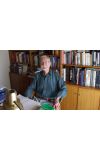
11 Jun 2012 03:19:50
The Durham-born author had lived in Umbria for many years. His publisher Hutchinson confirmed the news of his death this morning.
"Barry was a wonderful writer and this is a great loss," said publishing director Jocasta Hamilton. "Barry's work was characterised by a willingness to tackle big subjects with great humanity. His writing brought enormous pleasure as well as being thought-provoking and illuminating. We are incredibly proud to have had the opportunity to publish his last novel, The Quality of Mercy, which has been shortlisted for the Walter Scott prize. Many of us met him in 2010 and were as charmed in person as we had been thrilled by his novels."
From Morality Play, a 14th-century murder mystery, to Pascali's Island, set during the last years of the Ottoman Empire, many of Unsworth's 17 acclaimed novels explored different aspects of history.
Born in 1930 in a small mining community in Durham, the author travelled extensively in Greece and Turkey during the 1960s, teaching at the universities of Athens and Istanbul and starting to try to write. He published his first novel The Partnership in 1966.
Unsworth shared the 1992 Booker prize with Michael Ondaatje for his 10th novel Sacred Hunger, in which a ship's doctor leads a rebellion on an 18th-century slave ship and sets sail for Florida to create an egalitarian society which lives in denial of that "sacred hunger", profit. He was shortlisted twice more for the UK's highest literary honour, for Morality Play and for Pascali's Island, set in the summer of 1908 on a Greek island where a Levantine informer is found out by the islanders, and was longlisted for 2006's The Ruby in Her Navel, which takes place during the 12th century.
Writing about the past, Unsworth told the journal Littoral, has the "great advantage" of freeing the author "from a great deal of surface clutter". "One is enabled to take a remote period and use it as a distant mirror (to borrow Barbara Tuchman's phrase), and so try to say things about our human condition – then and now – which transcend the particular period and become timeless," said the novelist.
"Writers of historical fiction are not under the same obligation as historians to find evidence for the statements they make. For us it is sufficient if what we say can't be disproved or shown to be false. We are quite at ease in this no man's land of ignorance and doubt and dispute, absorbed in the ambiguities of trying to reach truth by mixing fact with invention. The search for truth in historical fiction – in fiction of any kind – is really a search for intensity of illusion. If this is achieved, the events and characters will take on a deeper reality than could ever be achieved by fidelity to the facts of the matter."
The novelist Ursula Le Guin said that reading Unsworth's 2009 novel Land of Marvels, set in the spring of 1914 in Mesopotamia, was "like watching an Olympic athlete about to win the gold: the seamless flow of action, the mastery of technique, seemingly effortless yet demanding attention and eliciting admiration as an end in itself".
The award-winning poet Sean O'Brien, in an appreciation of Unsworth for the British Council, said that the author was "a distinguished member of the long and various tradition of English writer-travellers in the ancient world. Unlike some of its exponents, Unsworth has not been tempted into inert exoticism, though he is clearly drawn to the sensuality and glitter of Mediterranean light and landscape, to the textures of stone and water, which he can render with a poet's rich economy. He is likewise drawn also to the sense of ancient mystery, of a world almost within reach."

